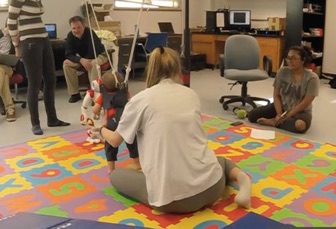Helping babies make first steps
NIH

GEAR is a collaborative research effort between the University of Delaware and Johns Hopkins University that brings together robotics engineers, cognitives scientists, and physical therapists, for the purpose of designing new rehabilitation environments and methods for young children with mobility disorders.
The envisioned pediatric rehabilitation environment consists of a portable harness system intended to partially compensate for body weight and facilitate the children’s mobility within a 10 x 10 feet area, a small humanoid robot that socially interact with subjects trying to engage with them in games designed to make them maintain particular levels of physical activity, and a network of cameras capturing and identifying the motion in the environment and informing the robot so that the latter adjusts its behavior depending on that of the child.
The realization of this system presents unique new research challenges in the fields of pediatric rehabilitation, robot control, machine vision, and computational learning.
GEAR
Oct 25, 2015
GEAR (Grounded Early Adaptive Rehabilitation) is an interdisciplinary research effort that aims at improving pediatric rehabilitation outcomes and drastically expanding intervention possibilities for young children with mobility disabilities, through controlled and adaptive social interaction with robots.
Publications
-
•Subregular Complexity and Deep Learning. Workshop on Learning and Automata, 2017.
-
•Use of Socially Assistive Robots in Early Rehabilitation to Promote Mobility for Infants with Motor Delays. International Conference on Social Robotics 2017.
-
•Principles of building “smart” environments in pediatric early rehabilitation. Workshop in Robotics: Science and Systems 2017.
-
•Temporal Convolutional Networks for Action Segmentation and Detection. IEEE Conference on Computer Vision and Pattern Recognition 2017,
-
•Deep Moving Poselets for Video-based Action Recognition. IEEE Conference on Applications of Computer Vision 2017
-
•Learning Models of Human-Robot Interaction from Small Data. IEEE Mediterranean Conference on Control and Automation 2017.
-
•Effect of adding vectors embedding second-order strictly piecewise automata to recurrent neural networks. International Conference on Grammatical Inference 2016.
-
•Using model theory for grammatical inference: a case study in phonology. International Conference on Grammatical Inference 2016.
-
• Segmental Spatio-Temporal CNNs for Fine-grained Action Segmentation and Classification. European Conference on Computer Vision 2016.
Software
-
•Source code for synchronized networked data collection, post-processing and playback, under the GPLv3 public license:
-
https://github.com/prarobo/gear
News
Our experimental setup for data collection is (almost) ready. We are running pilot studies to fine tune the system components.

We should be able to proceed with subject recruitment very soon!
